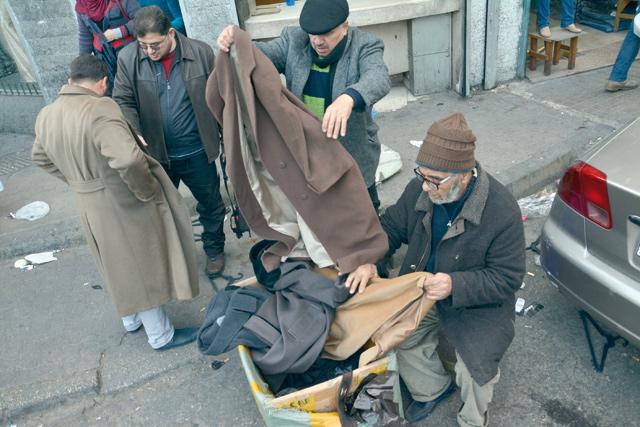You are here
Thrift shopping gains currency in Jordan
By Batool Ghaith - Jan 25,2021 - Last updated at Jan 25,2021

A vendor is seen selling second-hand clothes in downtown Amman in this photo taken on January 19, 2017 (Photo by Amjad Ghsoun)
AMMAN — Selling and buying second-hand goods is an increasing phenomenon in Jordan, according to commercial sector representatives.
It has become trendy among the younger generation nowadays to “thrift shop” whether from second-hand markets, the Friday market or online thrifting pages on social media, the sector representatives told The Jordan Times on Monday.
Several online thrifting pages have gone viral and gained thousands of followers, displaying vintage and second-hand clothing for prices that are somehow controversial as they are at times three folds the price in the flea market, according to experts.
“Thrifting is a culture, reusing what’s already been used and giving it a new life. It could be anything, from clothes to appliances, it is too broad. Lately thrifting is becoming more of a trend. But what we mean for it is to become a part of the culture,” said Ala’a Farraj, co-founder and PR manager of a thrift store.
Farraj also said that there is a percentage of people that take thrifting as “a lifestyle and change their approach to their everyday life to become more environment-friendly by reusing and recycling everything they use or need”.
On the reason behind starting her thrift store business, Farraj said that “after living abroad and seeing how people thrift everything from an environmental point of view, we wanted to bring that to Jordan. We also started the business to have a source of income after graduating from college, knowing that the market was not doing well”.
According to experts, thrifting is gratifying, such that once people experience it, they share their experience with others and so it spreads across the board.
“We get the best pieces that we can find with good quality. At first, we used to sell all the pieces that we offer, nowadays we sell only a quarter of our pieces, due to the increase in the number of competing of online thrift pages,” Mohammad Al Asmar, founder of an online thrift store, told The Jordan Times.
“Teenagers are strongly into thrifting, but all ages, social classes and backgrounds are represented. The stereotype that thrifting is only for poor people is wrong, rich people thrift too,” Asmar added.
He also said that online stores do not affect flea markets negatively, but “greatly boost” their revenues as they are the source of items sold at online thrift stores. “It is a win-win situation,” he noted.
“As the sale rates decreased drastically due to the pandemic, online thrifting businesses continued to generate us some income. Before the pandemic, sales were very good and I used to make a lot of money,” a vendor at the Friday flea market told The Jordan Times.
“I preferred to become a vendor at the Friday market to make extra money, so I can complete my education. It is a side job for me along with my main job with a good salary in a company. I am planning on studying e-commerce because I believe it will take over in Jordan in the near future and we already starting to see that,” the vendor said.
For Marwan Abd Al Hamid, an entrepreneur in Amman, thrifting is environmentally friendly and supportive of local businesses.
“I’ve been going to the Friday flea market since I was young every weekend, and my father has always been into thrifting, I started to go since I was 14 years old and I’m 20 now and I still go every weekend and I buy all my clothes from the Friday market, I always find nice clothes for a good price,” Hamid said.
“I believe that what entices the younger generation nowadays to thrift is the price and quality of clothes at the same time, and as a person who has a big number of followers on social media platforms, I promote the Friday market to my audience as a way to encourage people to go there and support local business,” Hamid said.
Farraj expressed hopes that thrifting would become a norm with no shame attached to buying or having second-hand goods or used products. The market will grow immensely and it won’t be restricted to a certain group of people, she noted.
Related Articles
DAMASCUS — In a Damascus flea market, Sham Alloush rummaged through a pile of clothes for something nice to wear for Eid Al Fitr that was no
AMMAN — Environmentally conscious clothing shops are continuously popping up in the Kingdom as Jordanians turn to more ethical and sustainab
AMMAN — Every Thursday evening and Friday, taxis and luxury cars can be seen dropping people off outside the Friday market located in Ras Al

















